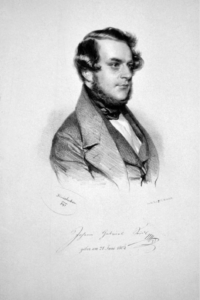Contradiction
(Poet's title: Widerspruch)
Set by Schubert:
D 865
for TTBB chorus and piano (also for tenor and piano)[probably spring 1828]
Wenn ich durch Busch und Zweig
Brech auf beschränktem Steig,
Wird mir so weit, so frei,
Will mir das Herz entzwei.
Rings dann im Waldeshaus
Rücken die Wänd’ hinaus,
Wölbt sich das Laubgemach
Hoch mir zum Schwindeldach,
Webt sich der Blätter schier
Jedes zur Schwinge mir,
Dass sich mein Herz so weit
Sehnt nach Unendlichkeit.
Doch wann im weiten Raum,
Hoch am Gebirgessaum,
Über dem Tal ich steh,
Nieder zum Tale seh,
Ach, wie beschränkt, wie eng
Wird mir’s im Luftgedräng.
Rings auf mein Haupt, so schwer
Nicken die Wolken her,
Nieder zu stürzen droht
Rings mir das Abendrot,
Und in ein Kämmerlein
Sehnt sich mein Herz hinein.
When I go through bushes and branches,
Breaking things off on the narrow path as I climb,
I feel that everything is so expansive, so free,
My heart wants to break in two.
Then around me in my house in the forest
The walls recede,
The foliage of the room becomes a vault
High above me, forming a dizzyingly high roof,
Nearly all of the leaves weave themselves
Into a pair of wings for me,
So that my heart, so expansive,
Longs for infinity!
But when I am out in the open spaces
High up on the edge of the mountains,
I stand above the valley,
I look down into the valley,
Oh! how confined, how narrow
Everything seems to me in the oppressive air;
Around my head, so heavy,
The clouds nod down,
I feel the threat of collapse
With the sunset around me,
And into a little room –
That is where my heart longs to go!
All translations into English that appear on this website, unless otherwise stated, are by Malcolm Wren. You are free to use them on condition that you acknowledge Malcolm Wren as the translator and schubertsong.uk as the source. Unless otherwise stated, the comments and essays that appear after the texts and translations are by Malcolm Wren and are © Copyright.
☙
Themes and images in this text:
Air Bushes and undergrowth Climbing Clouds Evening and the setting sun Hearts Here and there Leaves and foliage Longing and yearning Mountains and cliffs Roofs Rooms Valleys Wings
In Seidl’s 1826 collection of poems (Dichtungen: Balladen, Romanzen, Sagen und Lieder) Widerspruch appears as number three of six Jägerlieder (Songs of a hunter). We are therefore expected to read the text primarily as reflections on the tensions involved in the hunting life rather than as a more universal comment on human life in general (though there is nothing to stop an artistic presentation of the experience of hunting and shooting becoming a fully rounded portrayal of the human condition, as Turgenev showed with his ‘Sketches from a Hunter’s Album‘).
The hunter pursues his prey by climbing through the undergrowth and by cutting his way through narrow tracks. As the hunt progresses the woodland opens out, the canopy of the trees reaches higher and higher and the thrill of the chase seems to give the huntsman wings. The longing to kill a specific animal is transformed into a longing for infinity itself.
Everything looks and feels different once he is standing on the edge of the precipice, though. Perhaps the animal has escaped. Perhaps he has killed it successfully. (It really does not matter which.) He now feels both exposed and oppressed. The clouds and the air press down on him and all that he can think about is the opposite of the open spaces that he was so recently longing for. Evening and sunset threaten destruction or conflagration. He feels the need for enclosure and confinement.
Do we need to do any more than simply observe that human beings are indeed subject to these contradictory feelings at different times (or even at the same time)? Do we need an explanation (perhaps in terms of theories about sexual desire, conflicting bodily urges, or models of the mind, such as tensions between the ego and the id)? Are we being invited to draw some sort of metaphysical or religious moral from the contradiction (perhaps in terms of the impossibility of ultimate contentment with the human condition as it stands)?
☙
Original Spelling Widerspruch Wenn ich durch Busch und Zweig Brech' auf beschränktem Steig: Wird mir so weit, so frei, Will mir das Herz entzwei. Rings dann im Waldeshaus Rücken die Wänd' hinaus, Wölbt sich das Laubgemach Hoch mir zum Schwindeldach, Webt sich der Blätter schier Jedes zur Schwinge mir, Daß sich mein Herz, so weit, Sehnt nach Unendlichkeit! Doch wann im weiten Raum Hoch am Gebirgessaum, Ueber dem Thal' ich steh', Nieder zum Thale seh' Ach! wie beschränkt, wie eng Wird mir's im Luftgedräng; Rings auf mein Haupt, so schwer, Nicken die Wolken her, Niederzustürzen droht Rings mir das Abendroth, Und in ein Kämmerlein Sehnt sich mein Herz hinein!
Confirmed by Peter Rastl with Schubert’s source, Joh. Gabr. Seidl’s Dichtungen. Erster Theil. Balladen, Romanzen, Sagen und Lieder, von Johann Gabriel Seidl. Wien. Druck und Verlag von J. P. Sollinger. 1826, pages 191-192; and with Joh. Gabr. Seidl’s gesammelte Schriften. Mit einer Einleitung von Julius von der Traun. Herausgegeben von Hans Max. Erster Band. Wien, 1877. Wilhelm Braumüller k.k. Hof- und Universitätsbuchdrucker, pages 179-180.
To see an early edition of the text, go to page 191 [203 von 226] here: http://digital.onb.ac.at/OnbViewer/viewer.faces?doc=ABO_%2BZ179729304


